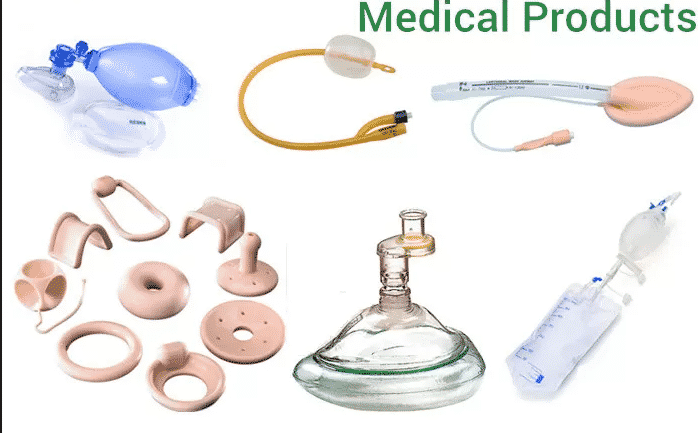What Is the Difference Between Food Grade and Medical Grade Silicone?
What is Food -Grade Silicone
Food-grade silicone is a type of silicone that is safe for use with foods. Silicone is used frequently in making molds used for food that begin as liquids and solidify. It is nontoxic; does not stain food, dishes, or cookware; is easily removed from cast objects, and is safe for use on various plastic objects.
Silicone rubber has been widely applied as a food-grade material in many applications, unlike any other elastomer in the world because of its exceptional purity, odorless, non-toxic, non-corrosive and inert properties.
Usually, all food-contact silicon products must meet any of the available food standard regulations introduced by several countries/ regions. Such regulations include the existing EU legislation and guidelines, Council of Europe Resolution on silicone, German recommendation XV from the BfR, and the US Food and Drug Administration (FDA) regulations.
FDA regulations for Rubbers, determination of specific elements and formaldehyde, and determination of low molecular weight species using GC-MS and LC-MS instrumentation. Usually, for food-contact applications, it is recommended to use platinum-catalyzed curing systems for silicone rubbers.
More About Food Grade Silicone
In addition, post-curing is also recommended for food-contact articles in order to improve the mechanical properties and most importantly, to remove the volatile by-products derived from cross-linking chemicals and low-molecular components. Some applications of food-grade silicone include baking molds, ice cube trays, grips of kitchen knives, whisks, spoons, and other kitchen utensils, and seals and o-rings in contact with foods.

what is Medical Grade Silicone
Medical grade silicone is tested for bio-compatibility and is appropriate to be used for medical applications and must meet certain high standards of manufacture, bio-compatibility and safety, e.g. EU Regulation 2017/745 (MDR) or ISO 10993.
Medical grade silicone rubbers are the most widely applied synthetic rubber of all synthetic elastomers in permanently implanted sub-dermal devices owing to their non-toxic and inert behavior. Although certain fillers and vulcanizing agents are used in silicone rubber manufacturing processes, the rubbers do not contain a wide variety of additives as compounding ingredients, which are used in organic rubber compounding processes. 、
There are two types of medical-grade silicones: room-temperature-vulcanizing types and heat-vulcanizing types. The term ‘medical grade’ is applied to the silicones that fulfill three requirements;
- The long history of successful implantation in both animals and humans,
- Manufactured under good pharmaceutical manufacturing conditions,
- Quality controlled for medical applications.
Platinum-catalyzed curing systems are recommended for medical-grade silicon rubber products. Peroxide curing is not recommended as it leaves or blooms acid residues after the curing process.
Medical-grade silicone is used to make feeding tubes, catheters, implants for long and short-term use, seals and gaskets, syringe pistons, scar treatment silicon sheets, gels, condoms, menstrual cups, respiratory masks. etc.
In the United States, implanted devices with medical-grade silicone are regulated by the Center for Devices and Radiological Health (CDRH) under FDA regulations. In addition, there is European medical device regulatory framework for medical-grade silicone.
A lot of companies use the term “medical-grade silicone.” This generally means one of two things:
Medical-long-term implantable material
This technical term describes a material that can stay in the body as part of an implantable device. Due to its purity, it’s generally too expensive for food-grade applications.
Medical grade
More technically referred to as medical-healthcare grade, class VI silicone tested for biocompatibility, this type is our material of choice for a wide range of products, including menstrual cups, baby bottle nipples, scuba mouthpieces, water pipes, and food and skin contact products.
Both medical-healthcare grade, Class VI, and medical-long-term implantable are considered safe for food contact. Both grades are almost always defined as liquid silicone rubber (LSR), which is injection molded for clean, consistent parts.
Both food-grade and medical-grade silicone products are manufactured under good quality control procedures in order to meet the existing regulations such as FDA, BfR, EU, etc. The odorless, non-toxic, inert, high-temperature stability and chemical resistance are the important properties of silicone rubber that enable their use in food-contact and medical-grade applications. A platinum-catalyzed curing system is recommended for both silicone grades. Both grades ensure that there is no harm to humans and the environment, and facilitate biocompatibility.
Medical-grade silicone, also known as Platinum cured silicone, is much more expensive to manufacture but has greater temperature and chemical durability.
Further Reading: Silicone Material
Medical-Grade means the silicone has been tested and approved by the FDA for biocompatibility – so it’s designed to be worn safely inside the body for long periods of time. Medical grade silicone is hypoallergenic, latex-free and contains no toxins, and is also nonporous and so resists bacterial growth.
The Medical-Grade silicone will never turn white with hard stretches.
No. If it does, it contains fillers, which are a cheaper alternative to medical-grade materials. HCR (High Consistency Rubber) is frequently loaded with filler that turns white when stretched. However, stiffer durometers (60, 70, and 80 durometers) have some amount of filler required to stiffen the material. Generally, this is still not noticeable when stretching LSR products.

Conclusion:
Food-grade silicone is a type of silicone that is safe for use with foods.
Medical grade silicone is silicone tested for bio-compatibility and is appropriate to be used for medical applications and must meet certain high standards of manufacture, bio-compatibility and safety, e.g. EU Regulation 2017/745 (MDR) or ISO 10993.
In ZSR group, most of our products are made of Food Grade silicone. We use some medical-grade silicone also when the clients request. Contact us if you have any custom-molded silicone products need help.
Technical Related
About Author: Z.S.R International Group
Z.S.R International Group(Hong Kong) co., Limited, is a one-stop supplier for molded silicone products and silicone products molding solution provider in the consumer products field. We offer OEM services from silicone product design to Silicone products contract manufacturing. We have the capability for custom silicone tooling, LSR(Liquid silicone Rubber) molded silicone products, solid silicone molded products, molded silicone multi-colored products. We also can custom molded silicone, custom molded LSR, custom molded dripping injection dispensing(co-injection) silicone multi-colored products.

